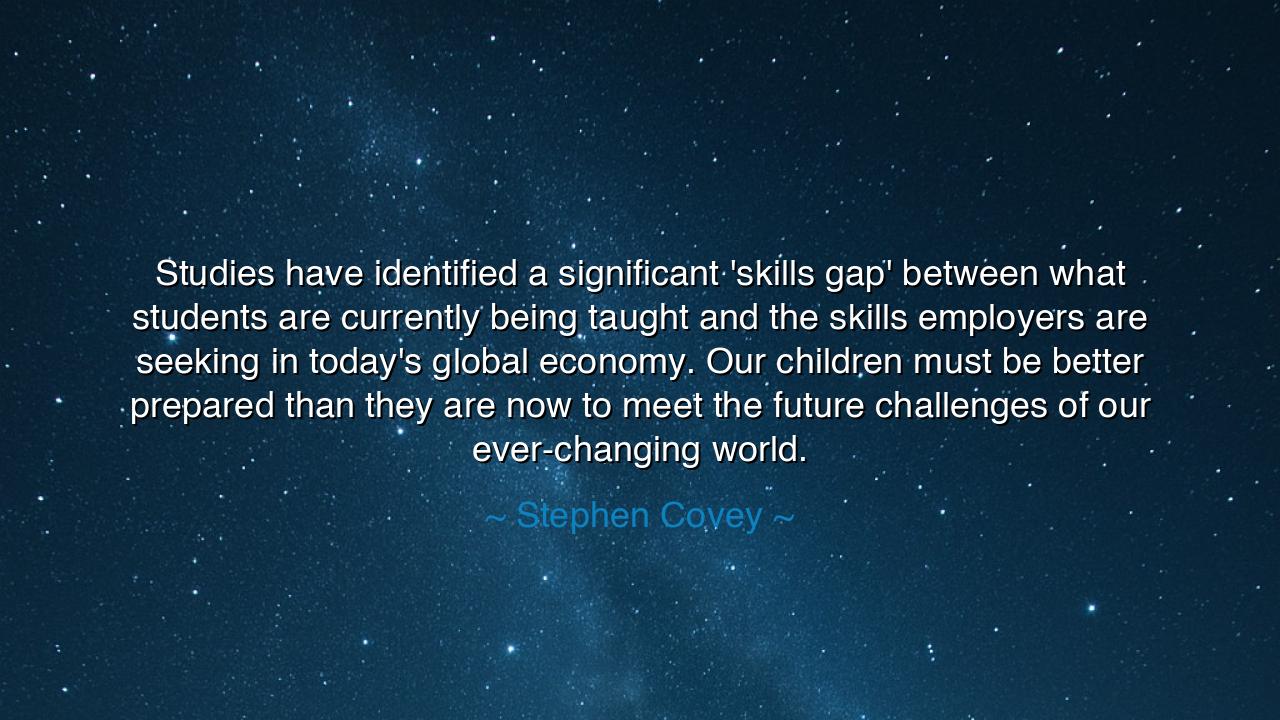
Studies have identified a significant 'skills gap' between what
Studies have identified a significant 'skills gap' between what students are currently being taught and the skills employers are seeking in today's global economy. Our children must be better prepared than they are now to meet the future challenges of our ever-changing world.






In the time of the ancient sages, it was said that "a people without wisdom is like a ship without a rudder"—drifting aimlessly, vulnerable to the winds and tides of fate. Stephen Covey’s words, "Studies have identified a significant 'skills gap' between what students are currently being taught and the skills employers are seeking in today's global economy. Our children must be better prepared than they are now to meet the future challenges of our ever-changing world," reflect a truth as old as civilization itself: the future of any society rests upon the education and preparation of its youth. If the current generation fails to equip their children with the skills they need, the ship of society will sail into troubled waters, unready for the challenges ahead.
In the time of the ancient Greeks, the great thinkers such as Plato and Aristotle understood that education was the foundation of a flourishing society. Plato’s Academy was established not merely to teach knowledge, but to prepare young minds for the complexities of leadership and the pursuit of virtue. He taught that the true aim of education is not just the acquisition of facts, but the cultivation of wisdom, the development of reason, and the ability to adapt to a world that is constantly changing. Covey’s observation about the skills gap is a modern reflection of the same ancient concern: without an education that prepares students for the realities of the world they will face, we fail them and fail our society.
History is replete with examples of civilizations that rose to greatness because they recognized the importance of preparing the next generation. The Roman Empire, for instance, flourished because of its commitment to training leaders and thinkers who could adapt to new challenges. The Romans valued practical education that included philosophy, rhetoric, and military strategy—skills necessary for navigating both the complex political landscape and the ever-changing nature of warfare. Rome’s greatness was not merely due to its military prowess, but to its ability to cultivate skilled and adaptable citizens who could think critically and respond to the world's shifting demands.
But as with any society, complacency often sets in, and there are times when the established systems of education falter. The fall of Rome was not just a result of military defeat, but also the decline of the empire’s educational system. As its leaders became more preoccupied with immediate concerns—power, wealth, and conquest—they failed to nurture the skills of the next generation. In doing so, they opened the gates to decline. Covey’s words are a cautionary tale: when we neglect the future, when we fail to prepare our children with the right skills to navigate the complexities of the world, we risk creating a society that is ill-equipped for the challenges of tomorrow.
The lesson here is clear: just as the ancients knew that education must evolve to meet the needs of the changing world, so must we. The world is no longer the world of yesterday. It is a world that demands not only technical skills, but also critical thinking, adaptability, and emotional intelligence. Our children, if they are to inherit a thriving world, must be prepared for an economy that demands not just knowledge, but the ability to innovate, to collaborate, and to solve problems in ways that previous generations could not have foreseen.
In practical terms, this means that education systems must evolve. It is not enough to teach children only the facts of today—they must be taught to think critically, to embrace uncertainty, and to build resilience in the face of adversity. We must cultivate skills that are not static, but flexible, ready to meet the challenges of a future that is as unpredictable as it is vast. Whether through technology, communication, or the arts, our children must be prepared for a world that will ask them to solve problems we cannot yet imagine.
Thus, the call to action is this: invest in our future by ensuring that our children are equipped with the tools they need to succeed. This requires not only a change in the content of education but a fundamental shift in how we think about the role of education itself. We must embrace adaptability, critical thinking, and creativity as the cornerstones of a modern education. Only then will our children be ready to face the challenges that lie ahead and build the world of tomorrow with wisdom and strength.






AAdministratorAdministrator
Welcome, honored guests. Please leave a comment, we will respond soon